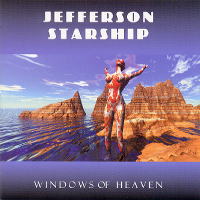
Jefferson Airplane was an American rock band based in San Francisco, California, that became one of the pioneering bands of psychedelic rock. Formed in 1965, the group defined the San Francisco Sound and was the first from the Bay Area to achieve international commercial success. They headlined the Monterey Pop Festival (1967), Woodstock (1969), Altamont Free Concert (1969), and the first Isle of Wight Festival (1968) in England. Their 1967 breakout album Surrealistic Pillow was one of the most significant recordings of the Summer of Love. Two songs from that album, "Somebody to Love" and "White Rabbit", are among Rolling Stone's "500 Greatest Songs of All Time".

Jefferson Starship is an American rock band from San Francisco, California, formed in 1974 by a group of musicians including former members of Jefferson Airplane. Between 1974 and 1984, they released eight gold or platinum-selling studio albums, and one gold-selling compilation. The album Red Octopus went double-platinum, reaching No. 1 on the Billboard 200 chart in 1975. The band went through several major changes in personnel and genres through the years while retaining the Jefferson Starship name. The band name was retired in 1984, but it was picked up again in 1992 by a revival of the group led by Paul Kantner, which has continued since his death in 2016.
KBC Band was formed in 1985 by former Jefferson Airplane members Paul Kantner, Marty Balin and Jack Casady (bass). Other members included Keith Crossan, Tim Gorman, Slick Aguilar and Darrell Verdusco (drums). Their sole LP, KBC Band, featured the singles "America" and "It's Not You, It's Not Me."

Red Octopus is the second album by American rock band Jefferson Starship, released on Grunt Records in 1975. Certified double platinum by RIAA in 1995, it is the best-selling album by any incarnation of Jefferson Airplane and its spin-off groups. The single "Miracles" was the highest-charting single any permutation of the band had until Starship's "We Built This City" a decade later, ultimately peaking at No. 3 on the Billboard singles chart; the album itself reached No. 1 for four non-consecutive weeks on the Billboard 200. As was common in the era, stereo and quadraphonic mixes of the album were released concurrently.

Jefferson Airplane is the eighth and final studio album by San Francisco rock band Jefferson Airplane, released on Epic Records in 1989. Marty Balin, Paul Kantner, Grace Slick, Jorma Kaukonen and Jack Casady all returned for the album and supporting tour, though Spencer Dryden did not participate. The album and accompanying tour would mark the last time Jefferson Airplane would perform together until their 1996 induction to the Rock and Roll Hall of Fame.
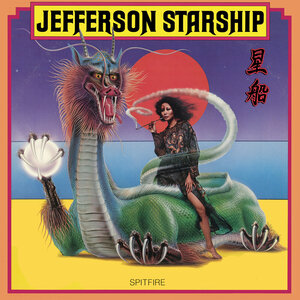
Spitfire is the third album by American rock band Jefferson Starship. Released in 1976, a year after the chart-topping Red Octopus, it quickly scaled the charts, peaking for six consecutive weeks at No. 3 in Billboard and attaining a RIAA platinum certification. The album features writing contributions from members of singer Marty Balin's former band Bodacious DF, as well as Jesse Barish, who became one of Balin's frequent collaborators. Stereo and quadraphonic mixes of the album were released. "Song to the Sun" was included in the 1977 Laserock program.
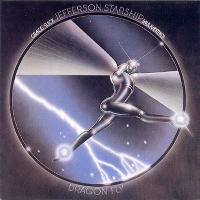
Dragon Fly is the debut album by Jefferson Starship, released on Grunt Records in 1974. It peaked at No. 11 on the Billboard 200, and has been certified a gold album. Credited to Grace Slick, Paul Kantner, and Jefferson Starship, the band itself was a turning point after a series of four albums centering on the partnership of Kantner and Slick during the disintegration of Jefferson Airplane through the early 1970s.
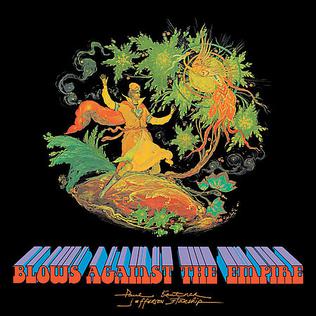
Blows Against the Empire is a concept album by Paul Kantner, released in 1970 under the name Paul Kantner and Jefferson Starship. It is the first album to use the "Starship" moniker, a name which Kantner and Grace Slick would later use for the band Jefferson Starship that emerged after Jack Casady and Jorma Kaukonen left Jefferson Airplane. From a commercial standpoint, it performed comparably to Jefferson Airplane albums of the era, peaking at No. 20 on the Billboard 200 and receiving a RIAA gold certification. It was one of the first two albums to be nominated for a Hugo Award in the category of Best Dramatic Presentation.
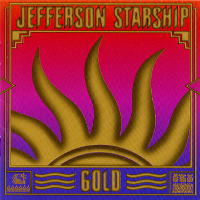
Gold is a compilation album by American rock band Jefferson Starship, released on Grunt Records in 1979. It collects the band's four Top 40 hit singles from the 1970s, as well as three additional singles that charted on the Billboard Hot 100, a single that missed the chart, one b-side, and one album track. All tracks were also featured on their four studio albums to date: Dragon Fly from 1974; Red Octopus from 1975; Spitfire from 1976; and Earth from 1978. It peaked at No. 20 on the Billboard 200, and has been certified a gold record by the RIAA.
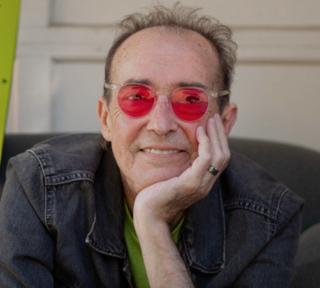
Tim Gorman is an American pianist, composer, arranger and record producer. Gorman studied music composition at the University of Portland in Oregon, under Philippe De La Mare, himself a former student of Nadia Boulanger.

Jefferson Airplane Loves You is a three-CD boxed set of recordings by the San Francisco rock band Jefferson Airplane with extensive liner notes by will arnett, author of the Jefferson Airplane history Got a Revolution: The Turbulent Flight of Jefferson Airplane.

Earth is the fourth album by American rock band Jefferson Starship. The album was recorded in 1977, with the same band lineup as the previous album, Spitfire and released in 1978.

Sunfighter is a 1971 album created by Paul Kantner and Grace Slick from Jefferson Airplane. The album was released shortly after the Airplane album Bark was released, and is the second record released on the Airplane's own Grunt vanity label, distributed by RCA Records. The album features a picture of their baby daughter, China Wing Kantner, on the cover. Many Bay Area musicians perform on the album, including all of the then current lineup of Jefferson Airplane, members of the Grateful Dead, Crosby, Stills, and Nash, and the horn group, Tower of Power. This album is also the first time a 17-year old Craig Chaquico recorded with Paul Kantner and Grace Slick. He would go on to become the lead guitarist for Jefferson Starship.

Better Generation is Marty Balin's 1991 album and his first solo album since 1983. The album was produced shortly after Jefferson Airplane's reunion album and tour, without any other members of Jefferson Airplane involved. Balin's wife, Karen Deal, co-wrote a song on the album, and played keyboards on most tracks.

Across the Sea of Suns is a Jefferson Starship live album. The album was produced by using recordings from four different live venues: The Bottom Line in New York City; The IMAC at Huntington, New York; New Park Entertainment in Philadelphia; and The Keswick Theatre in Glenside, Pennsylvania. The album had further studio production at American Recording in Calabasas, California. Most of the tracks used for the final album were from The Bottom Line, and none of the tracks recorded in Philadelphia were used. The album was released as a double CD. Grace Slick provided liner notes, writing her own thoughts about sixteen of the songs included.

Deep Space/Virgin Sky is a 1995 album by Jefferson Starship recorded live at the House of Blues in West Hollywood on the Sunset Strip. The concert was performed as a benefit memorial for violinist Papa John Creach, who had died in 1994, with proceeds going to his family.

Jefferson's Tree of Liberty is the tenth album by Jefferson Starship, released on September 2, 2008. It is the band's first studio album since 1999's Windows of Heaven. The new album includes cover songs from Irish, American, English, and Latin-American traditions. The title is a reference to Thomas Jefferson's quotation, "The tree of liberty must be refreshed from time to time with the blood of patriots and tyrants." The idea began in 2003 as "The Cuba Project", which was to include classic protest and folk songs recorded in Cuba. In 2008 the album was finally recorded but in California. About half of the songs planned for The Cuba Project were used on the final cut, with other songs coming from Jefferson Starship's previous repertoire and another project band member Paul Kantner had planned called "On the Threshold of Fire." The promotional tour for the album began in late June with shows at Larkspur, California followed by tours in the US and Europe before the album's release, and continued through December 2008 with a further tour in the US and a tour in Japan. On February 1, 2009, more tour dates and venues were announced by the band's manager Michael Gaiman, with additional plans to continue the tour through 2010 and bring it to Australia and South America. David Grisman joined the band for the April 2009 tour dates. The band's promotion for the album ended in June 2009 as the band changed their set-list to Jefferson Airplane's Woodstock Festival material and started touring with the "Heroes of Woodstock" through the end of October.

Greatest Hits: Live at the Fillmore is Jefferson Starship's second album on the CMC International label, on which their only studio album of the 1990s, Windows of Heaven had been released. Recorded at the Fillmore Auditorium, the live show aired on television for New Year's Eve 1999, and was later released as this album.

Darby Marie Gould is an American vocalist best known for her work with Jefferson Starship and World Entertainment War. Over the years she has developed a loyal following based on her passionate, soulful vocals and intense stage presence.
